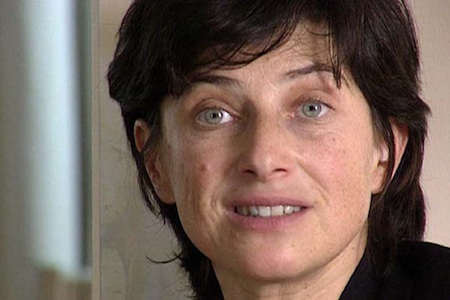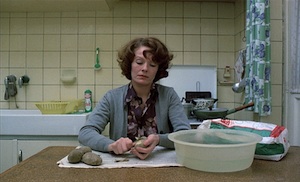“One day I met Janine Bazin and André Labarthe,” Chantal Akerman explains, opening up her unusual self-portrait in the Cinéma de notre temps series. “They asked me to do an episode of ‘Filmmakers of Our Time.’ I said, ‘Sure, why not? I put forth the names of several directors. I was told they’d already been done. So, almost as a joke, I said, ‘Okay, me then.’ And they answered: ‘Okay, you then!’”
She then goes on to fight with herself and her own thoughts, sitting throughout the episode in her own apartment reading out loud her thoughts on how she ended up in this situation of making this film. It is both illustrative of her creative process and one of the most neurotic films ever made. This master filmmaker (and gifted Jewish comedian) has never quite been given the credit she deserves historically, but she also seems incapable of taking herself too seriously.
Akerman par Akerman screens at the New York Film Festival Monday, October 8 at 6:15 pm with Philippe Garrel, Artiste.
1. Anti-authoritarian streaks (and jokes) often backfire.
“Why did I suggest myself when they asked me to do an episode of Filmmakers of Our Time? It’s now called Cinema of Our Time. Joke? Act of bravado? Was feeling good. Or bad… It’s like back at school. When I defied my teachers, it always backfired. Just like now. Especially when I feel neither good nor bad. No desire to be brave. I have no willpower at all.”
2. Always honor a contract.
“I have my habits and they’re hard to break, especially the bad ones. So I’m doomed to keep at it. Take the leap and don’t look back or you’ll become stone. I signed a contract and a contract’s a contact. There’s a starting date, a deadline and money to be spent. The trade-off: Some Akerman by Akerman, filmmaker of our time, for some money. So I’m stuck. I always respect my contracts.”
3. The problems (and fascinating questions) involved in appearing in your own work.
“Doing something about oneself and one’s work raises many questions. Questions about acting, documentary, fiction, about time, truth and cinema.”
“Why do I want to show myself? What will interest this audience? Who is this audience? I don’t know what I want to show of myself. I don’t want to show myself by showing myself. As I did before when I acted in my films. It’s surely a question of age.”
4. Focus, but don’t over focus.
“Every day I tidy up my apartment. I sit at my computer and stare out at a building. A girl on a balcony is doing tai chi. She’s right. If tried it, I’d be less tense. I’d have figured this episode out.”
5. Begin with the middle.
“It’s just a TV show and beginning is always hard. Maybe I’ll start [at] the middle. I’ll do the beginning after and I’ll leave the end open. It’ll grow out of the middle. Fortunately it’s nice out. Why am I saying that? It could be the middle. Even in the rain, she does tai chi. I’ll make a film about someone who does tai chi, rain or shine. I’d have a character and the weather. It would have to be funny, side-splittingly funny. As good for you as tai chi.





